US Release date : Monday, February 13, 1967
Strawberry Fields Forever / Penny Lane
By The Beatles • 7" Single • Part of the collection “The Beatles • Singles”
Last updated on August 2, 2023
US Release date : Monday, February 13, 1967
By The Beatles • 7" Single • Part of the collection “The Beatles • Singles”
Last updated on August 2, 2023
Previous single Dec 23, 1966 • "Love In The Open Air / Theme From "The Family Way"" by George Martin Orchestra released in the UK
Session Feb 13, 1967 • Mixing "A Day In The Life", recording "Only A Northern Song"
Session Feb 13, 1967 - Oct 29, 1968 • “Yellow Submarine” soundtrack sessions
Single Feb 13, 1967 • "Strawberry Fields Forever / Penny Lane" by The Beatles released in the US
Session Feb 14, 1967 • Recording and mixing "Only A Northern Song"
This album was recorded during the following studio sessions:
Beatles photo shoot with Jean Marie Périer
January 19, 1967 ?
4:07 • Studio version • A • Mono
Paul McCartney : Bass, Bongos, Electric guitar, Mellotron, Timpani Ringo Starr : Drums, Percussion John Lennon : Acoustic guitar, Bongos, Mellotron, Piano, Vocals George Harrison : Electric guitar, Maracas, Svarmandal, Timpani George Martin : Producer Geoff Emerick : Recording engineer Mal Evans : Tambourine Derek Simpson : Cello Norman Jones : Cello Neil Aspinall : Guiro Terry Doran : Maracas Tony Fisher : Trumpet Greg Bowen : Trumpet Derek Watkins : Trumpet Stanley Roderick : Trumpet Joy Hall : Cello
Session Recording Take 7: Nov 29, 1966 • Studio EMI Studios, Studio Two, Abbey Road
Session Recording Take 26: Dec 08, 1966 • Studio EMI Studios, Abbey Road
Session Overdubs: Dec 09, 15 and 21, 1966 • Studio EMI Studios, Abbey Road
Session Mixing: Dec 22, 1966 • Studio EMI Studios, Studio Two, Abbey Road
3:00 • Studio version • B • Mono
Paul McCartney : Bass, Handclaps, Harmonium, Pianos, Vocals Ringo Starr : Drums, Tambourine, Tubular bells John Lennon : Backing vocals, Congas, Guitar, Handclaps, Piano George Harrison : Backing vocals, Electric guitar, Handclaps George Martin : Producer Geoff Emerick : Recording engineer David Mason : Piccolo trumpet Ray Swinfield : Flute P Goody : Flute Manny Winters : Flute Dennis Walton : Flute Leon Calvert : Trumpet Freddy Clayton : Trumpet Bert Courtley : Trumpets Duncan Campbell : Trumpets Dick Morgan : Cor anglais, Oboes Mike Winfield : Cor anglais, Oboes Frank Clarke : Double bass Unknown musician(s) : Flugelhorn, Two piccolos
Session Recording: Dec 29, 1966 • Studio EMI Studios, Studio Two, Abbey Road
Session Overdubs: Dec 30, 1966 and Jan 4, 5, 6, 9, 10, 12, 17, 1967 • Studio EMI Studios, Studio Two, Abbey Road
Session Mixing: Jan 25, 1967 • Studio EMI Studios, Studio One, Abbey Road
“Strawberry Fields Forever / Penny Lane” was the fourteenth UK single from The Beatles, and the first one not to reach the number 1 position on Record Retailer‘s chart.
From Wikipedia:
The double A-side single was issued by Capitol Records in the US on 13 February 1967 (as Capitol 5810), and by EMI’s Parlophone label in the United Kingdom on 17 February (as Parlophone R 5570). Aside from the compilation album A Collection of Beatles Oldies, issued in the UK but not the US, it was the first release by the Beatles since Revolver and their August 1966 single. It was also the first Beatles single in the UK to be presented in a picture sleeve. The front of the sleeve contained a studio photo that again demonstrated the band’s adoption of facial hair; on the back cover were individual pictures of the four Beatles as infants, which heightened the connection to a Liverpool childhood. Recalling the reaction to the new single and the expectations it created for Sgt. Pepper, music critic Greil Marcus later wrote: “If this extraordinary music was merely a taste of what The Beatles were up to, what would the album be like?” Comparing the two sides in his book Electric Shock, Peter Doggett likens “Penny Lane” to pop art in its evoking “multifaceted substance out of the everyday”, and describes “Strawberry Fields Forever” as art pop, “self-consciously excluding the mass audience”. […]
In Britain, “Strawberry Fields Forever” / “Penny Lane” was the first Beatles single since “Please Please Me” in 1963 to fail to reach number 1 on Record Retailer‘s chart (later the UK Singles Chart). The single was held at number 2 behind Engelbert Humperdinck’s “Release Me”, even though the Beatles record sold considerably more. This was due to chart protocol whereby only the sales of the best-selling side of a double A-side were eligible, and the record’s overall sales were effectively halved. Following the speculation that the Beatles were due to disband, their failure to secure the number 1 spot was trumpeted in the UK press as a sign that the group’s popularity was declining. At the time, McCartney said he was not upset because Humperdinck’s song was a “completely different type of thing”, while Harrison acknowledged that “Strawberry Fields Forever”, like all of the Beatles’ latest music, was bound to alienate much of their audience but would also win them new fans. On the national chart compiled by Melody Maker magazine, however, the combination topped the singles list for three weeks.
In the US, “Penny Lane” topped the Billboard Hot 100 for one week, while “Strawberry Fields Forever” peaked at number 8. As in Britain’s Record Retailer, “Penny Lane” was the side favoured by chart compilers in Australia, where the single was number 1 for five weeks. The single was also number 1 in Canada and Norway, and peaked at number 4 in France.
It’s fine if you’re kept from being Number One by a record like ‘Release Me’, because you’re not trying to do the same kind of thing. That’s a completely different scene altogether.
Paul McCartney – From “The Beatles Anthology” book, 2000
The only reason that ‘Strawberry Fields Forever’ and ‘Penny Lane’ didn’t go onto the new album was a feeling that if we issued a single, it shouldn’t go onto an album. That was a crazy idea, and I’m afraid I was partly responsible. It’s nonsense these days, but in those days it was an aspect that we’d try to give the public value for money.
The idea of a double A side came from me and Brian, really. Brian was desperate to recover popularity, and so we wanted to make sure that we had a marvellous seller. He came to me and said, ‘I must have a really great single. What have you got?’ I said, ‘Well, I’ve got three tracks — and two of them are the best tracks they’ve ever made. We could put the two together and make a smashing single. We did, and it was a smashing single — but it was also a dreadful mistake. We would have sold far more and got higher up in the charts if we had issued one of those with, say, ‘When I’m SixtyFour’ on the back.
George Martin – From “The Beatles Anthology” book, 2000
BEATLES RECORD
THE Beatles had recorded several tracks of their new LP at EMI’s Abbey Road studios in London by the end of last week. Brian Epstein told the MM: “Any track could be the next single, but it won’t necessarily come from the LP. The third track would make a great single for anyone else, but the next Beatles single must be supreme.” The record might be released in February. One rumoured title is “Strawberry Fields Forever”.
A Beatles TV spectacular is definitely being planned but no dates were available at press-time.
In America Sid Bernstein, who promoted the Beatles’ previous New York concerts, says the group has turned down a one million dollar offer for two shows at Shea Stadium this summer.
From Melody Maker – January 14, 1967

NEW BEATLES RECORD – You can buy it on Feb. 17
THE Beatles’ new single is “Strawberry Fields Forever” — as exclusively named in the MM two weeks ago. The other side (there is no A or B side) is “Penny Lane”. The single will be released on February 17. Both are Lennon-McCartney compositions.
The first 250,000 copies of the single will be sold in a colour presentation sleeve, specially prepared by EMI. This is the first Beatles single since “Eleanor Rigby” and “Yellow Submarine” was released on August 5 last year.
“Strawberry Fields Forever” is about a Liverpool reform school for girls. “Penny Lane” is the name of a road in the northern part of Liverpool — near the areas where John Lennon, Paul McCartney and George Harrison lived.
“Strawberry Fields Forever” is very much a John Lennon composition. It has none of the lyrical McCartneys qualities. It’s a medium tempo number and doesn’t tell a connected story in the way that Eleanor Rigby does. The words are rather bleak.
The group are continuing to work on their next LP and may do a TV spectacular based on the tracks on the album when it is released. No release date has been set.
The third Beatles feature film is still being discussed and no date for its start has been fixed. The shooting is held up because of difficulties over the script.
From Melody Maker – January 28, 1967
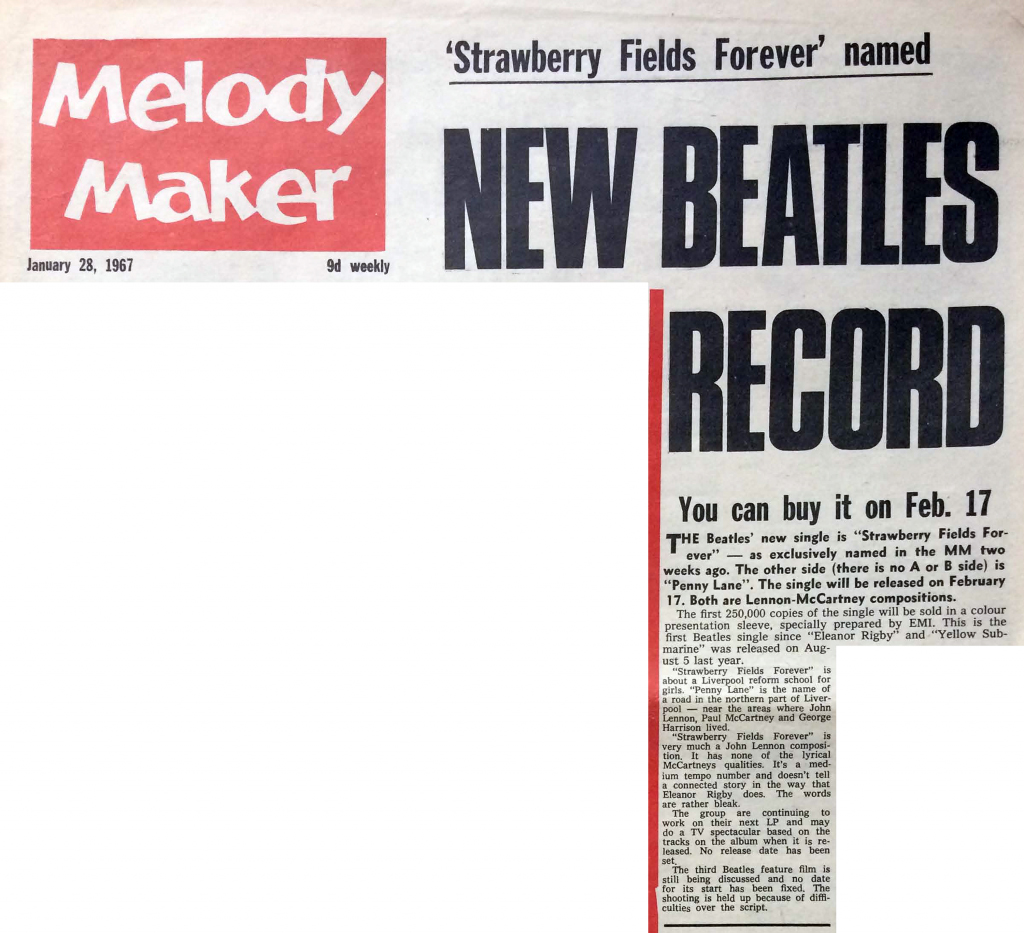
BEATLES: ‘Strawberry’ single all set
BEATLES’ new single, out on February 11, is “Strawberry Fields Forever” and “Penny Lane.” And for the first time since the Beatles began recording, it brings a Liverpool theme into their songs.
For both titles, written by John Lennon and Paul McCartney, are derived from areas of Liverpool.
The single is a double A-side and was one of three planned for their next LP. Manager Brian Epstein told Disc and Music Echo this week: “I feel this is their best single to date.”
The Beatles will be featured on “Top Of The Pops” with special films planned by Swedish TV producer Peter Goldmann, who is flying into Britain specially to film the boys. The films will be distributed to various TV companies.
The first quarter of a million new Beatles singles pressed by EMI will be sent out in special coloured, pictorial sleeve.
Because the two tracks have been taken from the Beatles’ LP recordings, it has not been decided whether to include them on the album.
From Disc And Music Echo – January 28, 1967
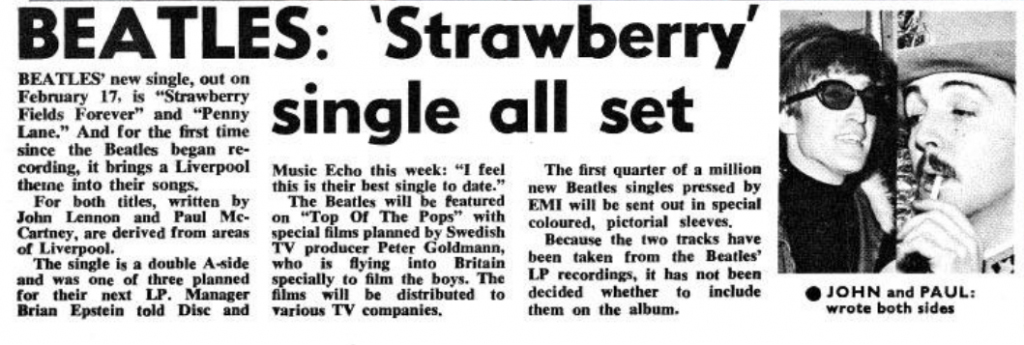
BEATLES FINISH SINGLE
GEORGE HARRISON in full Indian gear, arrives at the EMI Studios in St John’s Wood, London watched by slightly startled fans in more conventional English clobber. The Beatles were in the studios to complete their new single “Strawberry Fields Forever” to be released on February 17.
From Melody Maker – February 4, 1967
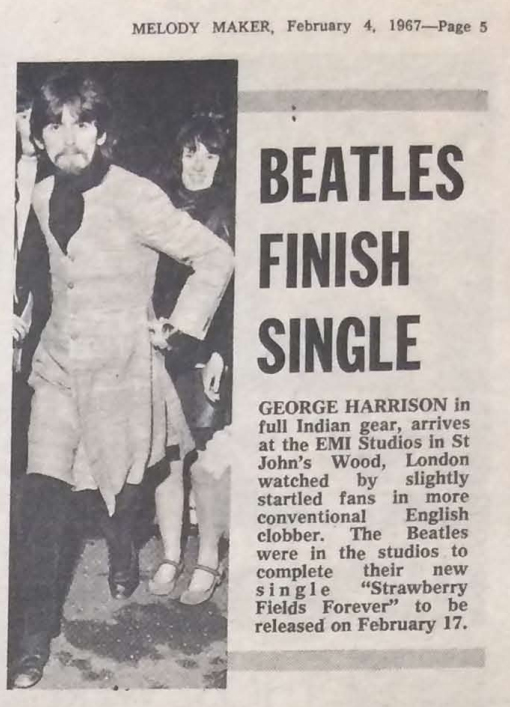
Beatles new single being played in Cannes streets by French Radio Luxembourg van…
From Melody Maker – February 11, 1967
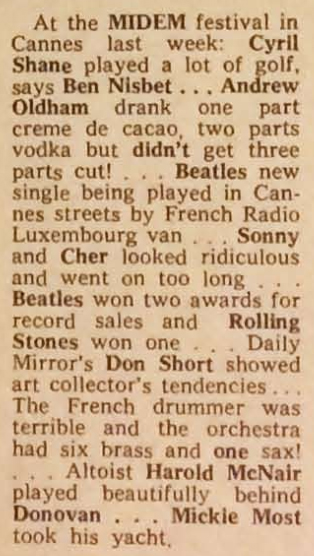
SCOOP OF THE WEEK! BEATLES:
I woke up with a tune on my mind and it was ‘Penny Lane’ – says MANFRED MANN
HERE it is! The Beatles new single! At the height of Monkeemania among fans and with the Stones’ every move hinged on controversy, once again John, Paul, George and Ringo look set to come crashing back to retrieve their pop crown.
“Strawberry Fields Forever” and “Penny Lane” – two new Lennon-McCartney compositions originally scheduled for the group’s next album – make up the double-sided single out next Friday (February 17).
It is their fourteenth release since the days of “Love Me Do” in October 1962.
Their last record, “Eleanor Rigby” / “Yellow Submarine”, which seems to have set the pattern for double A-side singles, held the top spot for a month. The question now, with so many new things happening in the chart, is whether they can do it again.
One person who thinks they can is MANFRED MANN, who reviewed the single for Disc and Music Echo at his Blackheath, London, home last weekend.
Says Manfred: “I’m glad I had the opportunity of hearing it more than once. In fact, Klaus had a copy soon after it was recorded and brought it round for me to hear.
The first time I heard “Penny Lane” I thought it was fairly pleasant – but it left me rather cold. Then I would find myself waking up in the middle of the night with a tune on my mind and realise it was “Penny Lane.”
It’s an excellent record. It has an obvious, more immediate appeal than the other side. It must be a success. Must be number one. The lyrics are good.
“Strawberry Fields” struck me at first as being manufactured and over-clever. Initially, I thought here are four guys trying to show they are not being left behind.
On second hearing the song seems to hand together a bit more. It’s very good. Basically a good melody. The way they record is brilliant. Everything here is so well thought out.
From Disc And Music Echo – February 11, 1967

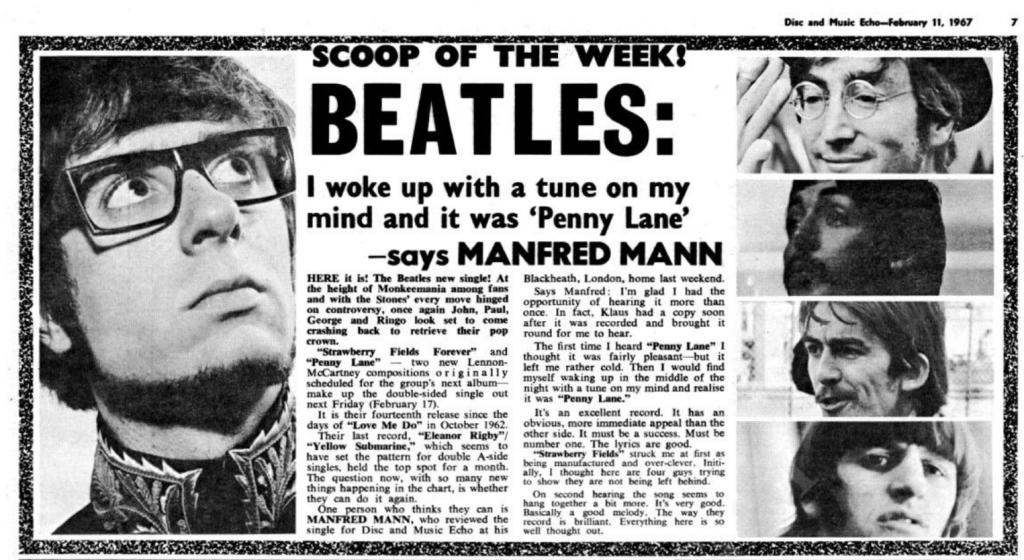
BEATLES: NO TO JUKE BOX, YES TO TOP of POPS
BEATLES will NOT now appear in film clip on this Saturday’s “Juke Box Jury.” The BBC has turned down Brian Epstein’ request that the film should be used full-length with the playing time of the record.
Said Billy Cotton Jnr. assistant head of Light Entertainment: “Use of the film was conditional on our playing the whole of the record and we couldn’t guarantee to do this.”
The policy of “Juke Box Jury” has always been to play only a part of each record, otherwise they wouldn’t be able to play so many.
The clips will be available for use on regional TV pop shows if required.
Both sides of the Beatles’ new single “Strawberry Fields Forever” and “Penny Lane” will, however, be heard on “Top Of The Pops” next Thursday – the eve of the release of the record. And the accompanying film will be seen.
Radio London claimed first airplay of “Penny Lane,” Radio City claimed first airplay of both sides of the single, BBC got special permission for advance plays… and on Monday Radio Scotland weighed in with the claim, by telegram to Disc And Music Echo:
“Radio Scotland first station to have ‘Penny Lane’ ‘Strawberry Fields Forever’ by Beatles at No 1 in the chart.”
From Disc And Music Echo – February 11, 1967
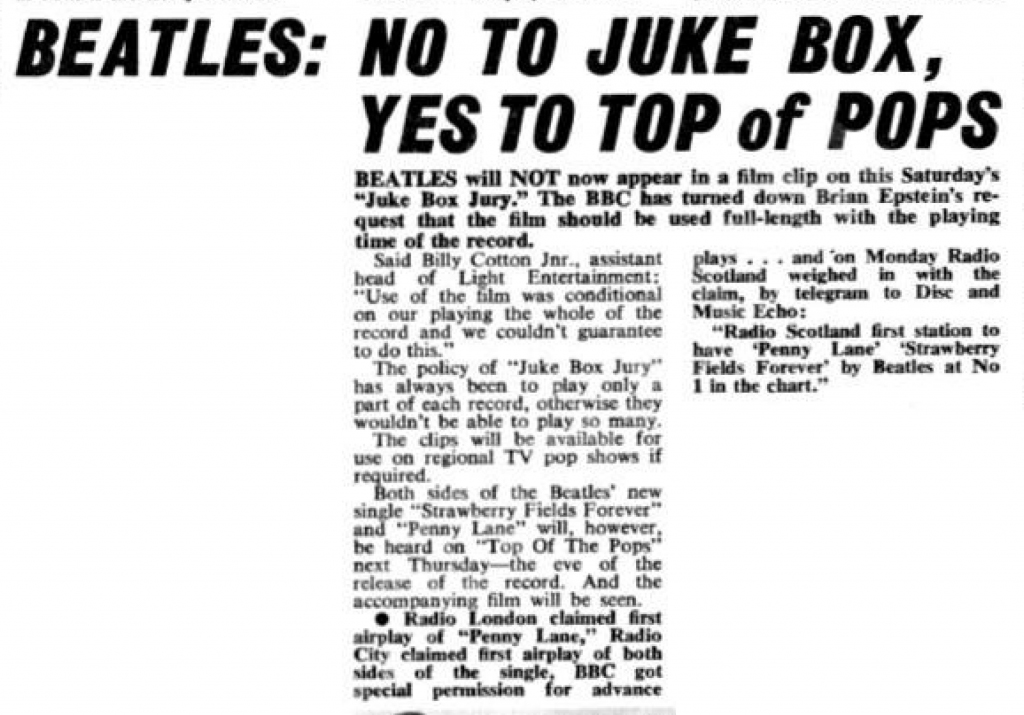
BEATLES: EIGHT MORE AWARDS
THE Beatles’ new single “Strawberry Fields Forever” and “Penny Lane” is released tomorrow (Friday), but at presstime EMI gave advance orders of 200,000 for the disc. The group, who were nominated this week for eight “Grammy” awards in America for “Eleanor Rigby”, “Michelle”, the “Revolver” album and the album’s cover, are still working on their next LP. Press officer Tony Barrow, told the MM: “The album will not be out before April and even that is not definite.”
There is still no date for the start of their third feature film, but it will probably start shooting by summer. Film clips of both sides of the new singles will be shown on Top Of The Pops tonight (Thursday).
From Melody Maker – February 18, 1967

MYSTERY OF THE BEATLE BABIES
THE first quarter of a million buyers of The Beatles’ new single will get a special coloured sleeve. On one side is a colour pic of The Beatles, in an ornate golden frame. They are all moustached and George has a beard as well.
The reverse side looks like a page from a family album and depicts four separate pix of four baby boys, all uncaptioned. The song titles, Penny Lane and Strawberry Fields Forever are also incorporated in the design. When asked why this particular motif, NEMS Press Officer, Tony Barrow, said that the childhood pix (all guaranteed genuine early Beatles) relate to Penny Lane and Strawberry Fields which were childhood haunts of John, Paul and Co. They are not identified because, Tony says, they hope everyone will have a lot of guesses before the correct captions are released. FAB-208 guesses that the small boy sitting bolt upright with a toy dog is John, it’s Paul in the pram, Ringo in the knitted jersey and George perched on a cushion. What say you? These pix have not been published before and the boys did a lot of rummaging before they came up with them.
From Fabulous208 – February 25, 1967
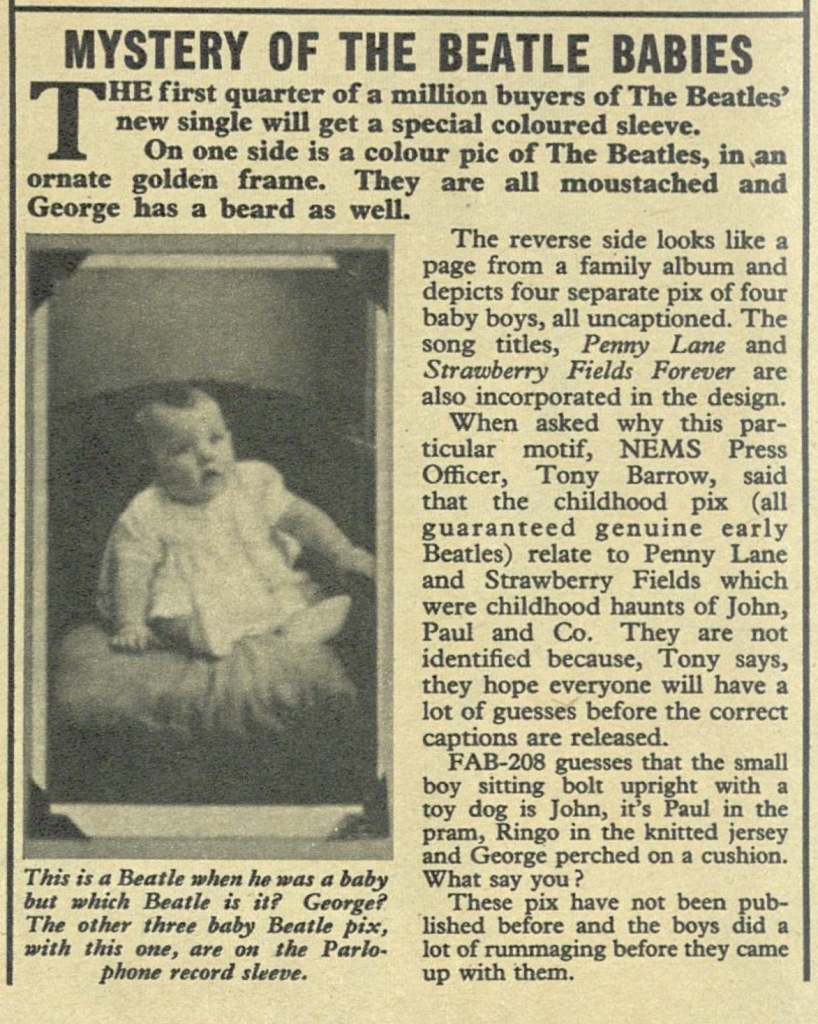
BEATLES back at the top
THE Beatles released Engelbert Humperdinck from tenancy of the top of the MM’s Pop 50 with their double hit “Strawberry Fields Forever” and “Penny Lane”.
The group are working on their new album — a follow-up to their “Revolver” hit LP. Their A & R man George Martin told the MM: “We are working every night on the album from seven o’clock until two in the morning. It’s even more way out than ‘Revolver’.“
The LP, which is half completed, will not be released before April.
From Melody Maker – March 4, 1967
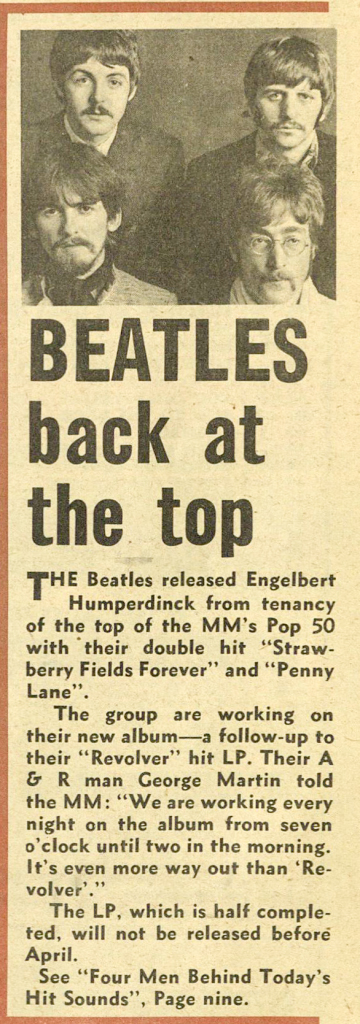
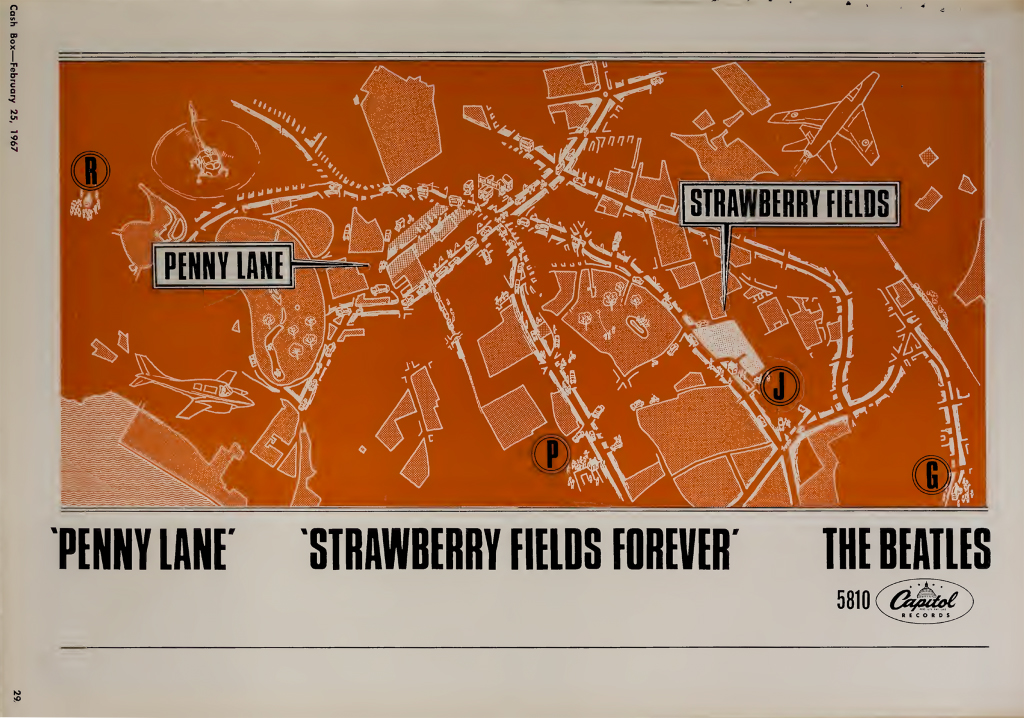
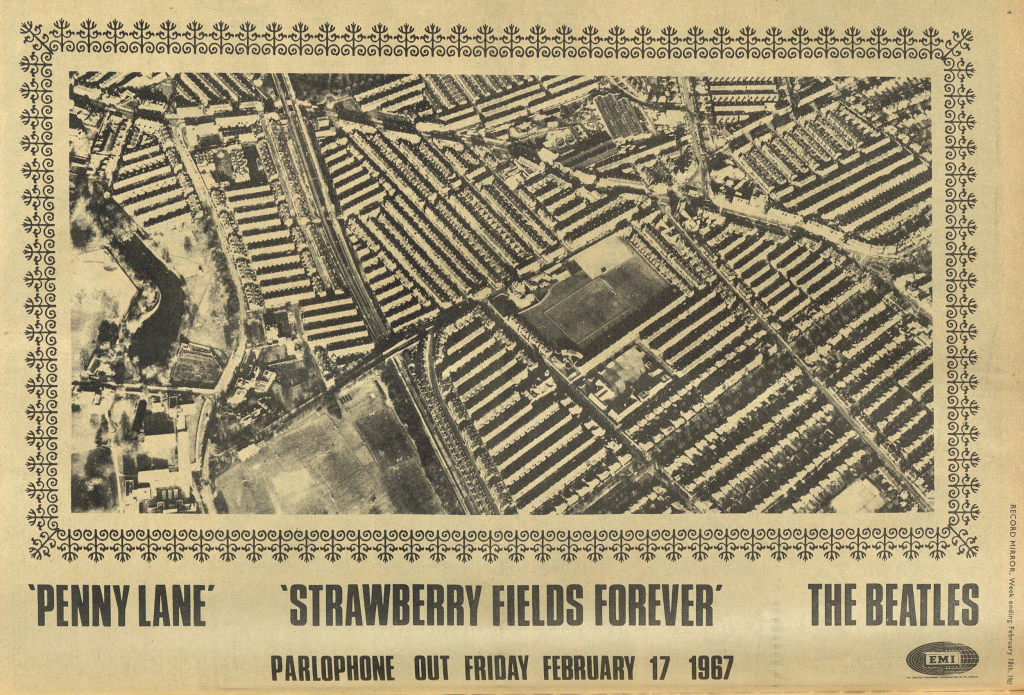
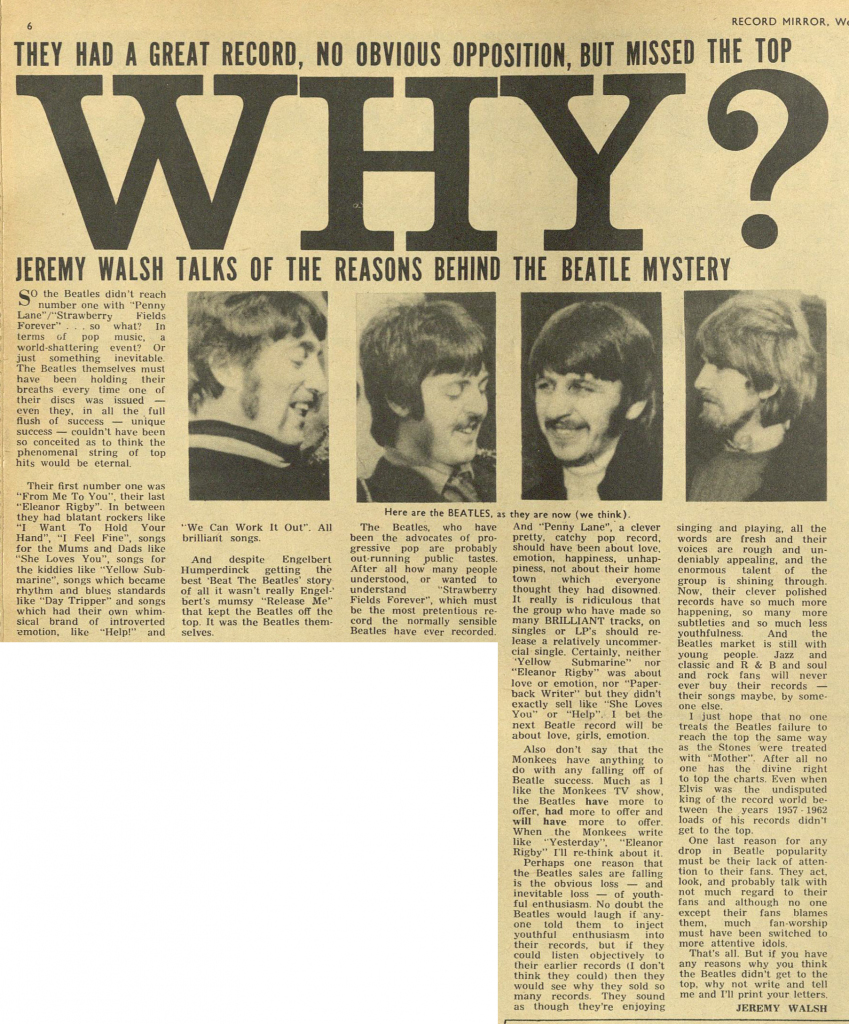
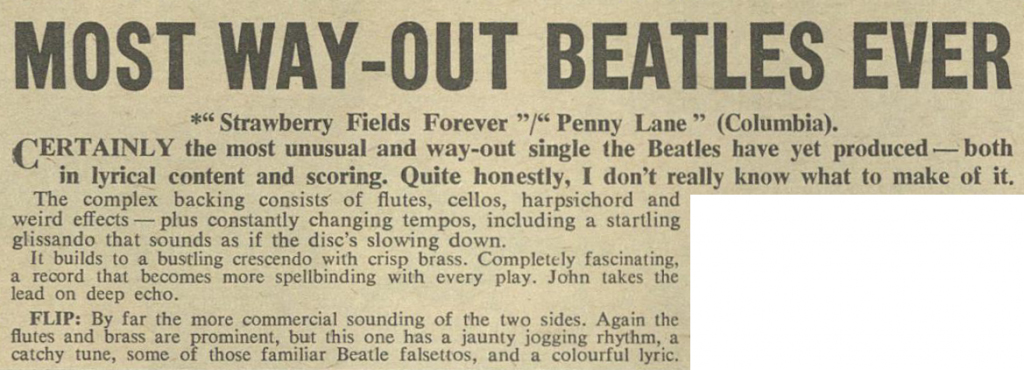
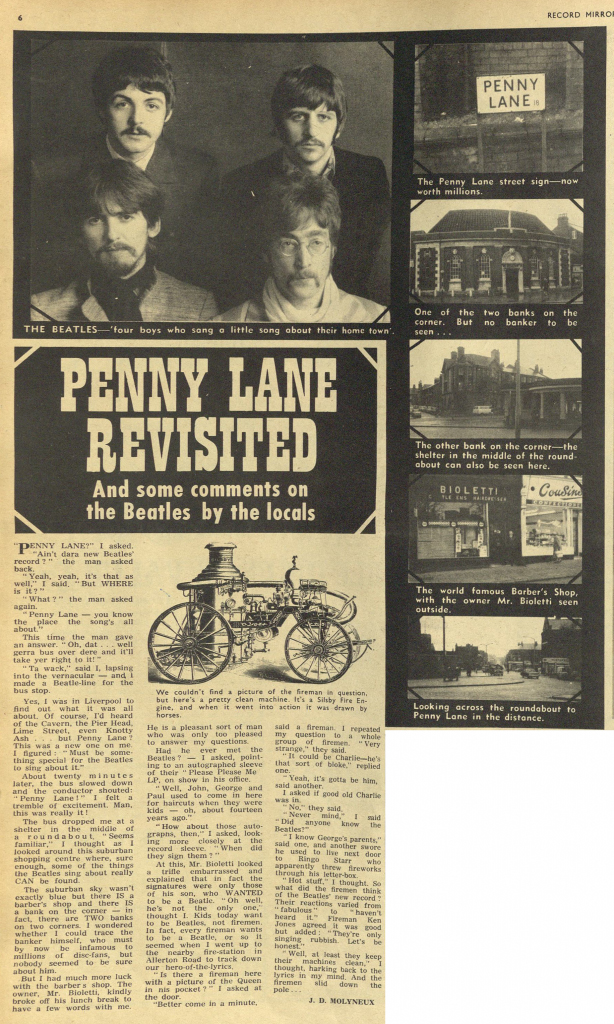

Notice any inaccuracies on this page? Have additional insights or ideas for new content? Or just want to share your thoughts? We value your feedback! Please use the form below to get in touch with us.